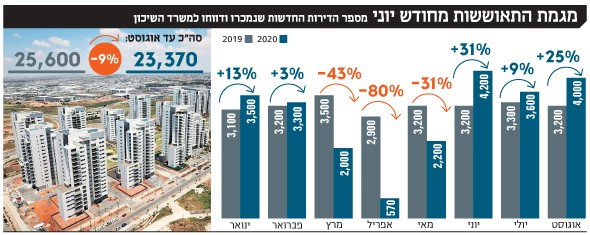Calcalist, Amitay Gazit, 07.10.2020
Buyers have returned to the housing market since June, Calcalist has learned from data from the Ministry of Housing. This is after the Ministry of Finance reported at the beginning of the week a decline in the sale of new apartments, with a decrease of 27% in the second quarter of this year. According to the director general of the Ministry of Housing, Yair Pines, the growing gap between the supply of apartments and demand may lead to an increase in prices.
Continuing the decline data presented by the Treasury, Pines emphasizes that the second quarter, April to June, was exceptional: "These are one-quarter figures where we all sat at home, so we saw a decline in the number of transactions. But it has to be looked at from a long-term perspective. "
The law requires construction companies to report to the Commissioner of the Sale of Apartments Law in the Ministry of Housing any transaction for the sale of an apartment within 40 days of its execution, hence the data reflect quite well what is done in the sales offices of all construction companies.
During the period of the first closure, there was indeed a 50% drop in the sale of new dwellings: in March to May, only 4,770 dwellings were sold, compared with 9,600 dwellings in the corresponding period last year. But the correction came in the next three months: from June to the end of August, 11,800 new dwellings were sold compared to 9,700 dwellings in the corresponding period, meaning a 22% increase. Pines: “We are seeing an amendment to the period of closure. The demand occupied from March to May was reflected from June. "

From January to August this year, 23,370 new dwellings were sold, compared with 25,600 dwellings in the corresponding period, which means a decrease of 9% against the background of the Corona crisis. On an annual basis, there may be another correction to reduce the gap, but it is clear to all professionals in the industry that the second closure will also affect the number of transactions this year.
Pines clarifies that even if there is a halt in demand, people will eventually need a roof: "Any change in an economic parameter will affect, but in the end households will not live on the street, and in order to provide a roof one has to build. , The purchasing power of households, the absorption capacity of contractors, an effect on the ability or desire of banks to provide credit, but all of these are secondary components.The main component is supply versus demand.Equilibrium should be in a place that does not produce a distortion of price increases.
"Starting with the municipal election campaign in 2018 and ending with the last three national election campaigns, there is a decrease in state investment in housing-supporting infrastructure, ie interchanges, drainage, kindergartens, schools, etc. These are the investments that support building permits. Now is the time to invest to close the gap. Between the increase in the number of households and the supply of apartments. "
Asked why there is no investment in infrastructure, he replied: "There is no approved budget for 2020 and we need to indicate budget sources to invest. Supporting housing infrastructure requires a budget of NIS 11 billion and another NIS 2 billion for classrooms and educational institutions."
Regarding the drop in the marketing of land for construction, he said that "the housing plan will be approved soon, and brochures for real estate tenders according to the rules of the new housing plan will be published immediately after the holidays."



